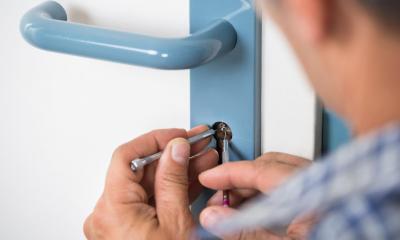
Thinking of setting up as a locksmith? You'll need good practical and mechanical skills and be prepared to work in different business and domestic settings. Check out our practical guide for starting and running your own locksmiths.
- Research your target market
- Customer profile
- Decide which goods and services to offer
- Price your services
- Buy an existing business
Research your target market
Estimating demand
You will need to find out if there is enough local demand for your new locksmith business so it's a really good idea to check out the existing competition. Your direct competition will come from other locksmiths that offer the same products and services as you as well as from outlets that offer only a proportion of them, such as key cutters (often this is a service offered by shoe repair outlets), DIY stores that stock a range of locks and padlocks and so on. Looking in the Yellow Pages - or online at yell.com - or similar directory is probably the best place to start or you could use the 'Find a locksmith' search tools on the Master Locksmiths Association (MLA) and Institute of Certified Locksmiths (ICL) websites. (Bear in mind though that not all locksmiths are members of a trade association, so these may not give you the whole picture of how much competition there is in your area.)
Your direct competitors will include:
- other independent locksmiths
- franchisees of one of the large companies like Yale Security Point and LockRite
- Timpson locksmiths - Timpson introduced this service in the 2010s and sales by its locksmith division have grown significantly in a short space of time
Catchment area
You will have to decide on the size of the area you will supply and then work out if it offers you enough opportunity for your business to succeed. It is important that your catchment area includes:
- domestic properties
- retail outlets
- offices and other businesses
- vehicle owners, including private individuals and fleets
- sufficient amounts of passing trade if you intend to open a retail outlet
You could leave some promotional material detailing your services with potential regular commercial customers like banks and building societies (who typically change the locks after they repossess a property).
You could also consider contacting the local constabulary for information on the level of burglary in the area to help you estimate the demand for extra security products and post-burglary services.
Business location
If you decide to operate solely from a workshop, the location of your business premises is not vital as customers will rarely, if ever, visit them. However, if you decide to have a retail outlet - and it can be an excellent way of attracting custom - think carefully about the best place to be located.
A high street shop benefits from a large amount of passing trade which means that more people get to know about the business. However, you may find that high street premises are too expensive so other areas may have to be considered. You may, for example, consider premises located in a local shopping precinct in a suburb. This type of premises will generally be more affordable but still be served by a reasonably sized catchment area.
Also check out local crime rates - you don't want to have to cope with excessive levels of shoplifting, break-ins and theft (although you may feel you have the expertise to safeguard your premises against any intruder!).
Why will customers choose your business
You need to make sure that enough customers will choose you rather than your competitors. It's a good idea to look at existing businesses to see:
- whether they are certified by the ICL or approved by the MLA
- what range of services they offer
- what range of products they sell
- what prices they charge
- what are their opening hours
- what type of customer are they attracting
- if their premises and/or vehicles are modern and smart
Check out future developments
Make sure that there are no immediate plans to change your proposed area, such as new road systems which mean that local traffic will bypass your shop. You could also try to find out whether a competitor is also planning to open an outlet offering the same or similar services to you in your proposed area. If, for example, Timpson was planning to open a multiservice outlet in the same street as you, you might decide to reconsider the location of your business. However, other developments can have a more positive impact. For example, the opening of a new supermarket nearby can greatly increase the amount of passing trade.
Research current trends, plus legal and tax issues
Customer profile
Your market
You are likely to have a mix of domestic and commercial customers, who may include:
- people that have had their homes or businesses broken into and who need their properties made secure once more
- people that use you in an emergency or if they have a problem that they can't solve themselves. These will include people who have locked themselves out of their homes or their vehicles and people that have lost keys to safes, jewellery boxes and so on
- owners and occupiers of business premises that need security devices fitted to make them more secure
- car owners wanting to improve their cars' security
- commercial customers, such as office-based businesses and hospitals that need to install electronic access control systems that can restrict unauthorised access to certain areas
- banks and building societies that repossess homes and need the locks changed
- off-the street custom. If you have a retail outlet you are likely to attract a certain amount of passing customers who need keys cut or want to purchase padlocks or other accessories that you sell
- residential landlords who need to replace locks on their properties, for example after evicting problem tenants
When carrying out work for commercial clients, you will often find that you will be working within strict requirements laid down by insurance companies.
The right image
It is vitally important that you, your employees and everything else about your business projects a professional and trustworthy image. Your customers need to trust you entirely or they will not use you for repeat business. Members of the Master Locksmiths Association (MLA) comply with a customer charter and are inspected periodically to monitor the quality of their work. Similarly, members of the Institute of Certified Locksmiths (ICL) abide by a code of ethics. You can find out more on the MLA and ICL websites.
Decide which goods and services to offer
Services
You might supply and fit:
- locks (both premises and vehicle), possibly that meet British Standard 3621, 8621 or 10621
- duplicate keys of all types
- padlocks
- master key systems
- electronic access control systems
- burglar alarms
- security safes
- fire safes
- grilles
- CCTV systems
- intercom systems
- security lighting
You may also offer the following:
- post-burglary property recovery services. This involves making a property secure after it has been broken into
- a fast lock changing service for banks, building societies and landlords following home repossessions
- opening doors to property and cars if keys have been lost, using non-destructive methods where possible
- opening safes, jewellery boxes and so on
- security surveys to advise the client on what needs to be fitted to make the property secure. Some firms offer these surveys free of charge in the hope that follow-up work will be generated as a result
- a 24 hour emergency service
- a contract service, whereby you periodically carry out assessments of commercial premises' security systems
- free consultations and quotations
Product sales
Along with the services you offer you may also have a retail outlet selling items that do not need specialist fitting or installation, such as:
- padlocks
- car security items, such as steering wheel locks and wheel clamps
- smoke alarms
- door furniture, such as latches and handles
- chains
- alarm fobs
- key rings
- basic DIY CCTV systems
Advertising your business
Whatever the nature of your business, you need to make sure that your potential customers know about you and the products and services you offer.
There are a number of things you can do to promote your business:
- join a trade association like the Master Locksmiths Association or the Institute of Certified Locksmiths
- if you have a shop make sure that the exterior is eye-catching. Because many people will only use your services a couple of times a year, it is important that they remember your business and come back to you
- have your logo and contact details painted on your vehicles. Try to think of a memorable name for your business
- make sure you give customers a card containing details of the business each time they use your services
- advertise in your local newspaper and any local directories
- launch your own website, showing all the features that will attract customers to your outlet. You could also use social media websites like Facebook to advertise your business
- have leaflets printed and distribute them to potential trade customers such as garages and body shops
- offer discounts and special offers, such as discounts for volume purchases, and advertise them in your window or on a sign outside your shop
- leave your card with insurance brokers so that householders can get more effective security devices fitted and benefit from lower premiums. (You may find that insurance companies will only recommend a locksmith that is a member of a recognised trade association. It's also likely that the products you fit will have to meet certain standards. The Master Locksmiths Association has produced a document 'An overview of mechanical lock and security related standards and why they're important to the insurance industry' which you can download from their website)
Price your services
Think about how you will set your prices. Bear in mind that the prices you charge will have to cover your overheads, including your own drawings.
It is a good idea to check how much your competitors charge for various services to make sure that you don't price yourself out of the market. You will have to decide how much to charge for:
- installing locks, security systems and safes. You may decide to follow the manufacturer's recommended retail price and then charge either a fixed fitting fee or an hourly rate
- post-burglary services. Again, you may decide that you will charge a fixed call-out fee plus the cost of any stock used or you may charge on an hourly basis
- 24 hour emergency services. You will be able to charge significantly more for emergency call-out services, particularly those outside normal office hours. You may decide to charge on a sliding scale, depending on the time of the call out and the distance you have to travel
- key cutting. The manufacturers and suppliers of key blanks should be able to give you some idea of the usual retail prices of the different types of keys. It is, of course, entirely up to you as to whether you follow the recommended prices. If you carry a large range of key blanks - particularly specialist blanks - you may be able to establish a reputation as being always able to satisfy customer queries and through this you may be able to charge slightly higher prices than your competitors
- security consultations and quotations. You may decide that a good way of attracting custom is to offer free consultations and quotations, particularly if you anticipate that they will lead to you securing the job. Remember to monitor this carefully so that not too much of your time is spent doing work that you are not being paid for
- work carried out under contract. Certain clients may engage you to work for them on a monthly basis, for example, servicing safes or ensuring the premises remain secure and you may decide to offer them a different tariff of charges
If your business is able to offer a service that your competitors does not or stocks a range of products exclusive to your area, you may be able to charge higher prices than the competition.
Special offers and discounts
You may consider running special offers throughout the year. These can result in increasing your customer base. However, it is important that you monitor your takings during these times to make sure that you are getting more custom, rather than just giving your regular customers cheaper services.
It's a good idea to keep an eye on your competitors to see what discounts they offer throughout the year. You can then decide whether or not to match their offers.
Members of the Institute of Certified Locksmiths (ICL) will replace a lock free of charge if they need to drill it or destroy it to gain entry, and you may decide to offer a similar guarantee even if you are not a member of the ICL.
Buy an existing business
You might decide to buy an existing farm supply business rather than start your own venture from scratch. Buying a going concern can mean that the products, customers, regular sales, staff, premises and equipment are already in place.
But buying a business can be a hazardous, expensive process unless you have the right skills and experience on your team, including legal and financial know-how. Establish the genuine trading and financial position, so that the price you pay for the business is not too high.
Franchises
Franchising can be a good 'halfway house' between starting out from scratch and buying an existing business. There are various franchise opportunities in the locksmithing sector, including LockRite. If you decide to operate as a franchise you'll still be setting up your own business, but you'll benefit from the initial training, a comprehensive package of tools and stock as well as help with advertising and marketing. Visit the LockRite website for more information on how you can become one of their franchisees. The Franchise Info website may have details of other locksmith franchise opportunities.


